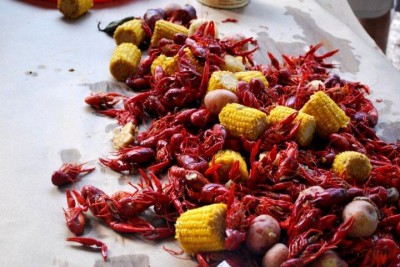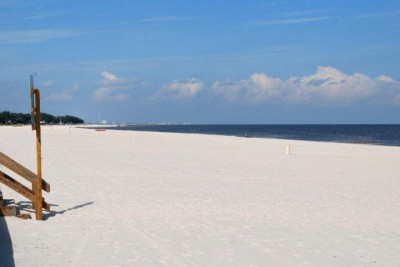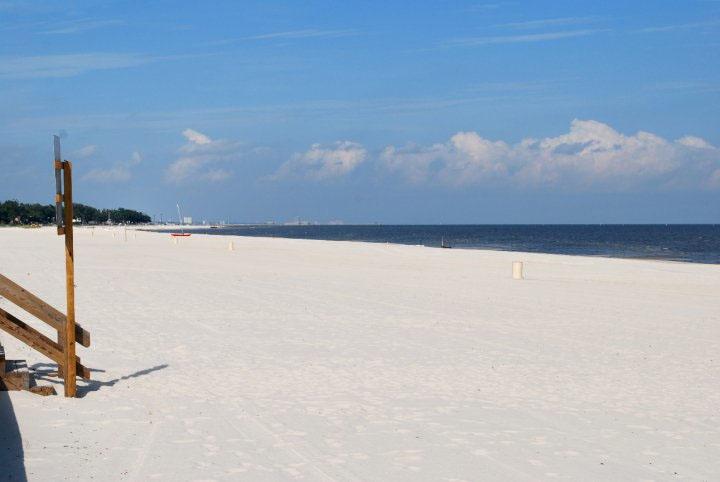Hurricane season has officially begun again for the battered Gulf Coast communities. The first big tempest of the season, Hurricane Alex, caused coastal evacuations and sent clean-up boats and oil skimmers home to safe harbors this week. While Alex veered west of the oil-impacted shores, hitting Texas and northern Mexico, the storm will have an unforeseeable impact aggravating the oil spill clean-up. And Alex is just the first in a season predicted to contain an above average payload of mega-storms.
I talked with Gulf Coast residents who are fearful that the coming hurricanes might not so graciously avoid their shores. After surviving Katrina and coping with BP’s oil, there’s fear one more catastrophe could wipe out once and for all both the economic and cultural roots of these resilient Gulf Coast communities.
 There was no sign of alarm or pessimism, however, among the Gulf Coast natives of Pass Christian, Mississippi last week. I joined them for what was to be their final traditional Southern crawfish boil for the foreseeable future. It was a spirited gathering, boasting 80 pounds of fresh seafood, young children beside their toothless elders, and lively local storytelling late into the night. Crawfish boils are a cultural spring tradition on these shores, and this one held special gravitas; the Mississippians and guests like myself were all gathered for a symbolic last hurrah before the impending oil inundation hits their shores.
There was no sign of alarm or pessimism, however, among the Gulf Coast natives of Pass Christian, Mississippi last week. I joined them for what was to be their final traditional Southern crawfish boil for the foreseeable future. It was a spirited gathering, boasting 80 pounds of fresh seafood, young children beside their toothless elders, and lively local storytelling late into the night. Crawfish boils are a cultural spring tradition on these shores, and this one held special gravitas; the Mississippians and guests like myself were all gathered for a symbolic last hurrah before the impending oil inundation hits their shores.
“This will be our last crawfish boil for a while. We have no idea when we’ll get back out there on the water to get them fresh, if ever,” Biloxi resident Brian Southwick remarked.
While the mood remained festive and the crawfish delicious for over five hours of finger-licking revelry, an undercurrent of sour oil fumes tainted the air around the outdoor gathering, a lingering specter reminding all that this was to be the end of an era of abundant local seafood. Crawfish harvesting season lasts from December through July, but the fishermen here are ending their season early this June due to the encroaching oil. The oil is doing more than simply robbing these fishermen of revenue and a livelihood, the spill is robbing these Gulf Coast communities of age-old cultural traditions and the backbone of their civil society.
Michael Logan, a native of Biloxi, Mississippi and avid Gulf kayaker, predicts the oil spill will hurt fishermen the most, but added that “our whole livelihood here is based around our water.” Biloxi and the surrounding gulf coast region rely on the fishing and casino industries for the large majority of their employment and income. Biloxi in particular has a vibrant tourism industry with over a dozen casinos, the home site of Jefferson Davis, and long stretches of prime white sandy real estate.
“Would you want to come to a place with petroleum beaches? It’s going to kill all the tourism…our casinos will close down, it will be a ghost town situation, we’ll be done,” predicts Logan.
 Tourism is already visibly declining. Biloxi’s long white sandy beaches lay vacant in the shadows of quiet casinos and docked boats. I spent an afternoon on one of these beaches, swimming in the Gulf’s waters the last day possible before they were proclaimed off limits the following day by local authorities. They were fearful of the chemicals being used as oil dispersants, another unknown variable in this catastrophe crippling the Gulf shore communities.
Tourism is already visibly declining. Biloxi’s long white sandy beaches lay vacant in the shadows of quiet casinos and docked boats. I spent an afternoon on one of these beaches, swimming in the Gulf’s waters the last day possible before they were proclaimed off limits the following day by local authorities. They were fearful of the chemicals being used as oil dispersants, another unknown variable in this catastrophe crippling the Gulf shore communities.
Mark Vanaman, a lifelong resident of the Mississippi coast and former oil rig employee, says he took a lower-paying construction job over his offshore employment after Katrina took his home and forced him to move inland. Vanaman reinforced the message of Biloxi’s empty beaches, saying, “Another storm could wipe us off the map, literally. After Katrina they said 75 percent of our population moved back, but this is turning into a nightmare. Pray for us.”
For an area all too familiar with nightmarish catastrophes, the predictions that the oil spill will be more damaging than Katrina are daunting. Biloxi was battered by Hurricane Katrina, losing 90 percent of its coastline structures, and as the six year anniversary of Katrina approaches this August, reconstruction and revitalization of the region’s economy are still incomplete. The forecasts for a particularly active hurricane season have these residents worried that their entire communities could be forced to uproot and resettle on higher ground.
The silver lining to this apocalyptic prediction for the Gulf Coast: It could make a potent catalyst for a nationwide energy evolution. The answer to Logan’s prediction of Gulf Coast ghost towns and the prospect of Bryan Southwick’s next crawfish boil may just depend on whether the U.S. government and citizens get serious about shifting away from our destructive oil dependency. Until then, go enjoy some fresh seafood while you still can.
